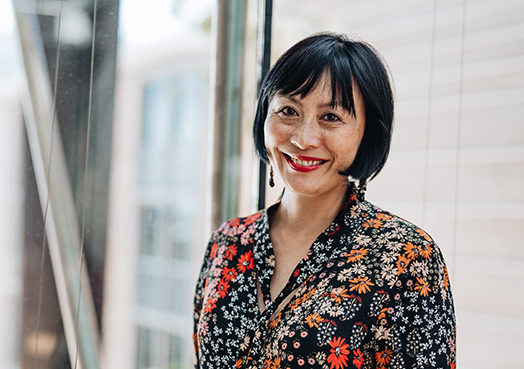Meet this trailblazing female computer science engineer
From instigating gender equity initiatives to giving talks and mentoring, Pia Seeto’s focus is a more equal future.
From instigating gender equity initiatives to giving talks and mentoring, Pia Seeto’s focus is a more equal future.

With a dynamic CV that has seen her deftly climb the career ladder of global giants, as well as dive right to the heart of the matter with bright–eyed startups, Pia Seeto has underwritten every step of her journey with a passion for equity, diversity and inclusion.
“It’s an awareness that, once awakened, never leaves you,” she says.
Pia graduated from UNSW Computer Science Engineering (CSE) in 1995 and got her first big opportunity to create change in this area when she was made Chair of the Diversity and Inclusion Council at Ericsson in 2013.
As Ericsson’s Diversity Lead, she introduced a leadership support structure to promote women in leadership in Ericsson’s key discipline areas. She also mentored young female employees who had chosen to pursue careers in engineering and telecommunications.
In 2014, this program of work was officially recognised when Pia won the UNSW Judy Raper Award for Leadership in Engineering. The annual award recognises an alumna who has made a “sustained and significant contribution to engineering through demonstrated leadership characterised by passion and commitment.” She says winning the award has been pivotal in much of what has followed since.
“The biggest opportunity was to reconnect with UNSW. If I’m honest, my undergraduate experience was a bit hit and miss, but receiving the award put me in this new headspace of wanting to give back,” she explains.
“I soon realised what an honour the award was and what an incredible platform I’d been given. It’s allowed me to join strong networks and create lasting connections.”
Soon after winning, Pia volunteered to sit on CSE’s Industry Advisory Board and last year was elected as the Chair. She says her mission is to improve the student experience and help the School better define itself and articulate its pre–eminence.
“UNSW Engineering in general, and CSE in particular, have enormous prestige and are held in high–esteem globally. One of the key challenges the School faces is to promote this, back this up and continue to live up to our reputation.”
“As Chair of the CSE Board, I’m excited to take the next chapter forward. I want to focus strongly on improving the student experience and smoothing that transition from university to industry. I’d also like to improve the School’s relationship with industry and create new, and highly practical ways for industry to connect to the School and students.”
Pia worked at Ericsson for 11 years and by the end of her time there, in addition to promoting gender, diversity and inclusion across the organisation, she was managing teams of up to 60 project managers, and planning, negotiating and executing multimillion–dollar programs of work for corporate clients like NBN, Vodafone and Telstra.
In late 2017, Pia decided to take a short career break to figure out her next steps, but this plan was interrupted when she was tapped on the shoulder by a startup called vennu. It immediately captured her imagination. “The aims of the company aligned so well with my personal values that I fell in love with the idea,” she says.
vennu offers a marketplace of unique community spaces such as Girl Guides and Scout Halls, church halls, surf clubs and community–owned spaces that can be hired by the hour or day for parties, weddings, retreats, performance spaces or film productions.
“It was our ambition to make community spaces more accessible and harmonise the booking process for both sides of the market. I had a lot of fun working with the all-women team to develop the digital marketplace. We launched in the Illawarra/Shoalhaven region of NSW, which is an amazing little diverse area, and now vennu is expanding Australia–wide,” she explains. “They’re starting to get some runs on the board, which is really nice to see.”
After successfully launching vennu’s platform, Pia was tapped once again and asked to consider a job in Queensland, this time by consulting firm, virtuGrp, which is her current role.
“Our client is Energy Queensland and we helped to articulate their digital telecommunications strategy and are now supporting them to translate it towards execution,” she says.
Having been a keen advocate for gender, diversity and inclusion for a long time, Pia says it now comes as second nature to promote the awareness to others.
“These days I speak at a lot of events and often raise it at board sessions with CSE. It’s a topic I constantly revisit, review and stay abreast of, no matter where I am. I love having those conversations in different organisational settings. People need the insights first of all, and then a little time to absorb the information before they can plan how they, as a company or individual, can make a difference.”
In terms of where she thinks the industry is now at in its evolution towards gender equality, Pia says the concept has moved beyond the awareness stage and is now squarely in practical implementation.
“We have gone beyond the basic questions of, ‘Do you understand what gender equality means?’ and ‘Do you understand why an intervention might be required?’ and ‘Do you know what unconscious bias is?’” she says.
“We’re now moving into the next phase, where people really have to challenge themselves to say, ‘Okay, now we’ve got the ‘warm and fuzzies’ out of the way, how do we genuinely and authentically execute and follow-through these aims?’ There is still a way to go yet, but it’s wonderful to see it mature to this next level.”